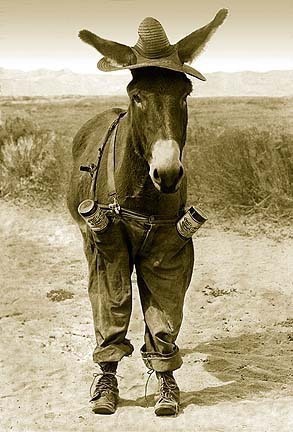Recommended Posts
QuoteThey were true. Many people get confused by the definition of hunter gatherer. Paying to exist does not happen there either. They all take part in providing food, education, etc. It's an honor.
And there is hierarchy. And political division. For example, the Yanonmamo, who are pretty well understood on the cultural anthropology arena. Napoleon Chagnon may find issues with your statement. Paying to exist does not happen there. Instead, working to exist does. We work for pay and pay for existence. They skip the middleman.
QuoteWe created a system of trade and bartering. With that came class division, power, hierarchy, etc. From that, naturally, stems greed, war, conflict.
Incidentally, all cultures developed these on all continents and did so independently. Perhaps it says something about human nature that we may want to keep on the front burner with regard to political systems.
And the Yanomamo have wars and raids and violence regardless of trade and bartering. Class division and power were apparently present before money and trade. But money and trade was a way that developed that could even out power. Hence, a wimp like me has a hot wife and two kids even though such would be impossible when physical prowess determined who'd be a daddy.
QuoteThis is why we created religion. Due to the historical evolution of greed, greed based war, population based based disease we created religion out of conditioned necessity.
I don't think this is the case. Rather, I think that religion was created in an effort to explain that which we did not understand. Our species is curious and wants answers on things. When we don't know what those stars are, then we can invent explanations.
QuoteBut here is a question: The neolithic revolution (switching from hunter-gatherer to a more sedentary, non-nomadic, farming lifestyle) started in the fertile crescent and then over the span of 10,000 years started happening all over the world in different places at different paces. And with no communication. So is it just innate to choose convenience?
I think it is innate to choose convenience. Convenience = survival. When your spend 5k calories searching for food that will land you 6k calories and spoil before you can get the rest, it does not do well for survival.
Farming is, by no means, sedentary, either. But if you could expend 10k calories planting and receive 50k calories over a period of three months, then you've increased your chances for survival because your energy demands are lower. And you want to live where the water is so you don't have to expend energy getting it.
Is it intrinsic? Not so much as curiosity. All it took was one person to say, "I had this farro wheat that I gathered. Some of it fell into a crack in the mud. A couple of weeks later, it started growing. I wonder if I put more wheat into mud cracks whether it will grow too." It does. "Hey, we're out of cracks in the mud. Why don't we make some." Hence, plowing. "Hey, we're out of mud. We've just got dirt. It won't grow wheat. But I took some water and made mud and plowed it and planted." And irrigation started.
QuoteWe now live in a world we hold intrinsic value on humans over the natural world.
Absolutely. I hold value in my kids and wife over anything else. Myself is up there pretty high, too. If it's my kids or a million mosquito, those biters can kiss their asses goodbye.
QuoteIt is a anthropocentric nightmare we live in.
For you it is a nightmare. For me, it's nice that my kids can eat.
Quotecommon sense would tell us to take care of what we NEED to survive
Indeed. Hence agriculture, which allows billions more of us to survive.
My wife is hotter than your wife.
JohnRich 4
QuoteThen the price of fur dropped again. Many were forced to return to their old ways. Guess what, many died because they had already forgotten what they needed to survive. I wonder how many Native Americans could survive today if it came to dog eat dog.....
Yes. When the technological societies like ours implode, the only people remaining that will continue on will be the "primitive" ones that still know how to take care of themselves, by living off the land.
One only has to experience an outage of electricity for several weeks to see how quickly our society implodes. Without electricity, there's no gas pumps. Without gas, there's no transportation. Without transport, there's no food.
The truth is, we're so highly specialized, that we are constantly living on the verge of chaos, and it takes very little disruption to push the finely tuned choreography over the edge.
I predict these disruptions will become more frequent in the future, and last longer. You better be prepared for it, and teach your children to cope too. If you live day to day, always expecting the store to have milk, and always expecting the gas station to have gas, then you're going to be in trouble.
Hurricane season is just about here again. I'm filling my spare gas cans up.
QuoteQuoteDid common sense become extinct when some humans transitioned from surviving to thriving and then began to help the weaker humans survive?
I was sort of talking about this around the campfire during a weekend canoe-camping trip. The subject came up about how dumb horses are. And my response was that horses have been around since dinosaur times, so they must be doing something right. But then, maybe it's just their running speed that has allowed them to survive all those eons of threats. So if you have the ability to run real fast, maybe you don't need to be that smart. (Hang in there, I know you're wondering how this story relates to the topic at hand.) And humans, with all of our modern conveniences, have sort of learned the equivalent of "running real fast". We don't have to be real smart any more. We use GPS for navigation instead of map and compass, or stars. We use calculators for math, instead of pencil and paper. We have imbued our machines with common sense, to the point where we don't need it ourselves any more. Take away someone's GPS and calculator, and they can't find where they're going, or balance their checkbook. We're becoming a lot like horses.
Horses have survived this long for one reason: Run first, rationalize later. It's about the only way a prey species can live long enough to reproduce.
Common sense has been disapearring for a long time. Not helping the situation is universities and colleges hiring staff who have little or no work experience in the real world. Research profs are very well educated and have a lot to offer students, but the knowledge that only a person who has been there-done that can never be passed on by some who hasn't been there or done that.
Originally employed as a weapon of war, the hammer nowadays is used as a
kind of divining rod to locate the most expensive parts adjacent the
object we are trying to hit.
jcd11235 0
QuoteNot helping the situation is universities and colleges hiring staff who have little or no work experience in the real world. Research profs are very well educated and have a lot to offer students, but the knowledge that only a person who has been there-done that can never be passed on by some who hasn't been there or done that.
I disagree. I've encountered many professors that have "been there" and "done that," that have next to zero capability teaching anyone what they know; they don't know how to teach. I've encountered some of those same professors that lacked sufficient understanding of the theory behind the material to be able to apply the knowledge to a different problem.
That's not to say that professors with working experience are uniformly incompetent teachers, or even that research professors are uniformly competent professors.
My own experience has been that professors at community colleges (two year colleges that tend to offer, among other degree programs, the first two years of a four year degree, e.g. B.S or B.A.) are generally far superior, w/r/t teaching, to four year university professors because they are there because they want to teach, not to do research and not to build up their resumé. Thus, I'm inclined to believe that a desire to teach is just as, perhaps more, important than whether or not professors have "been there" and "done that."
Originally employed as a weapon of war, the hammer nowadays is used as a
kind of divining rod to locate the most expensive parts adjacent the
object we are trying to hit.
jcd11235 0
QuoteBut I have encountered far more who had worked only in research, are great teachers, but haven't a clue as to how the theory applies in the real world when away from the sanitary and controlled conditions of a lab or computer.
I can't think of a single research professor that I've met that fits that description. I've met lots of students that are unable to apply theory to real world applications, but that's typically because they memorized the theory instead of learning it, so they lacked any real understanding of it. I've found professors with real working experience to be more likely to rely on "the sanitary and controlled conditions of a … computer," since that's what they relied on when working outside of academia. When outside the comfort zone of their favorite software, they're like fish out of water.
As an example, a few months ago I posed a probability problem to a professor who was an actuarial fellow with plenty of experience in his field. I was looking for a closed-form solution, and every method I could think of was unsuitable for one reason or another. The professor suggested that I write a short program to simulate and analyze all 2^100 (approximately equal to 1.27 x 10^30) possible outcomes. Although the program would be easy enough to write, assuming each processing core of my computer could analyze one outcome per clock cycle (highly unlikely), it would require over seven trillion years for the program to run to completion. That's hardly a practical solution, and certainly would not work in the real world.
Butters 0
QuoteAccording to his argument, shouldn't we just let those people at the bottom just fall off the face of the Earth and not "help" them?
You make a lot of assumptions. I posted a question, I didn't post an argument ... you appear to be lacking in sense in this thread.






I think it would be more accurate to say that the dregs of the once proud race of people have stayed on the reservation, with the vast majority of the more motivated, hard working (and often that means educated, because they worked for that) folks leaving the reservation for a better life elsewhere.
I saw some statistics a while back about the chance that someone born on a reservation who went to college would return to the reservation--it was something like 3%, and those were all either teachers or politicians/tribal leaders. Basically, the whole top of the bell curve bailed out because the reservation was such a pit.
Tom@SnakeRiverBASE.com
SnakeRiverBASE.com
Share this post
Link to post
Share on other sites